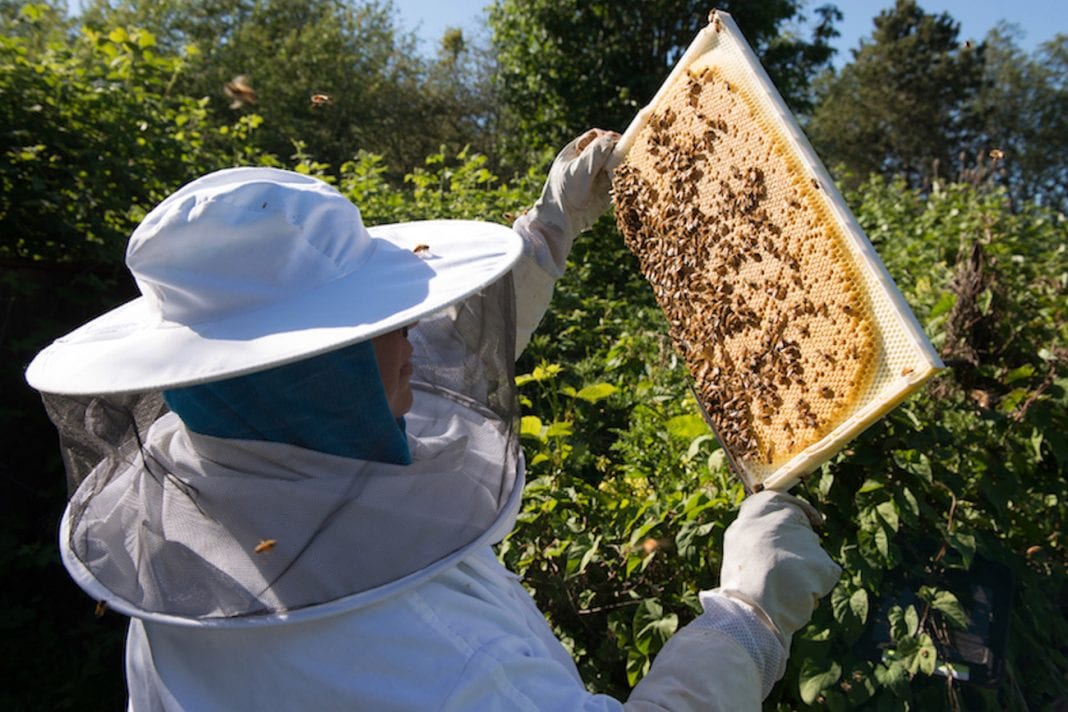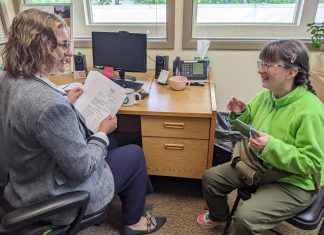Marie’s Bees owner Marisa Papetti lives on a third of an acre tucked away in a Bellingham neighborhood. She’s friendly, likable and enthusiastic about bees, farming, and animals.
Papetti started keeping bees by accident four years ago when a friend asked her to house her hive. The friend was moving into Bellingham city limits and wasn’t allowed to keep them in her new backyard.
For the next year, Papetti learned how to bee keep by watching her friend. “Any time she came out to check on them, I’d go out too,” says Papetti.
It awakened a new interest in bees, and she began researching everything and anything bee related.

Sadly, the hive was destroyed during a strong winter storm, and all the bees died. “It was just awful,” she says.
Papetti returned to a life without bees for a year. “It was so lonesome in the backyard,” she recounts, comparing the companions to having a bunch of little dogs around all the time. “They’re very social. They’ll check you out and are very intelligent.” She missed her bees and when her husband asked her what she wanted for Christmas the following year, she said she wanted a hive.
That spring, she raised her own bees, bought from Snohomish Bee Company. A few months later, she received a mysterious phone call from a man she didn’t know, saying his father, a beekeeper, had just passed away. He offered Papetti some of his beekeeping things, if she was interested.
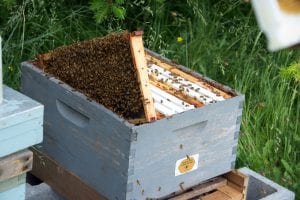
She went to visit the man, not sure what to expect. “I was thinking I might get a couple things, maybe a bee suit. I had $100 in my pocket just in case,” says Papetti. The man says ‘Here it is,’ and “he waves his hand over this giant amount of beekeeping equipment, $9,000 to $10,000 worth, and he was like, ‘Here you go!’”
“It took us two loads filling a trailer and a truck both times,” says Papetti. And just like that, her business had begun.
At the time, she was selling eggs and produce out of her home garden, so it was easy to add honey to her list of products.
Papetti named the business after her husband’s spunky Sicilian grandmother, Marie, who often asked the couple to have a child named after her. Instead, Papetti christened her company Marie’s Bees, in her honor.
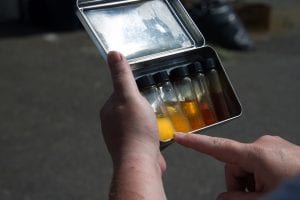
That was two years ago. The company is doing well and Papetti exudes happiness.
She and her 90-year-old grandmother teach school groups, senior centers and anyone who will listen about bees and beekeeping. She’s an engaging speaker and bees are a fascinating subject.
“All the worker bees are female,” says Papetti. Male bees are called drones and they’re the only ones allowed to go from hive to hive; they’re only used for mating.
“The legend is, that [drones] go hive to hive because they’re the ones to tell the news,” she explains. “They’re the gossip guys and they sing lullabies to the babies.”
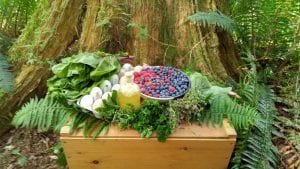
Unfortunately, and unbeknownst to them, drones are sometimes responsible for carrying disease. Disease and humidity lead to 60 percent of Papetti’s bees dying every year.
The queen works hard to make up for the survival rate by laying 1,000 to 2,000 eggs every day.
Papetti cares for her bees and works hard to make sure they’re happy and healthy.
“I never take all of their honey; I take what I would consider a surplus,” she says. “Most people who commercially keep bees harvest once per year. We like to harvest and label our honey based on the month, so you can get an idea of what pollen is in it.”
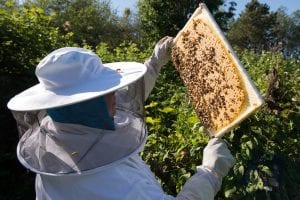
Honey differs every month; flavor and viscosity change depending on environmental factors, season and drought.
“The September before last we had really intense days when we couldn’t go outside because of all the smoke in the air,” says Papetti. “The honey was really dark like molasses and it tasted smoky. You can’t recreate that.”
People who suffer from allergies often find relief by eating honey harvested from trees and shrubs that cause them discomfort. Papetti has a friend with terrible cottonwood allergies who takes two tablespoons a day of honey produced during the cottonwood season. Her allergies have gotten much better.
“My grandma has acute lymphatic leukemia and has been on hospice for 9 months,” Papetti says. Every day she takes honey, hot water and lemon. “It’s noticeable on the days that she does it. You can tell that her breathing is easier, and she sleeps better.”
Antimicrobial benefits of honey have been used in wound, skin and hair care since ancient Egypt.
Quality and attention to detail have landed Marie’s Bees products in homes and local markets, including Old World Deli, Appel Cheese Farm, and Evolve Chocolate + Café, among others.
Papetti and her grandmother deliver weekly to homes and stores. Order your local organic honey, eggs and produce today from Marie’s Bees, or sign up for one of her popular cheese-making classes.




























